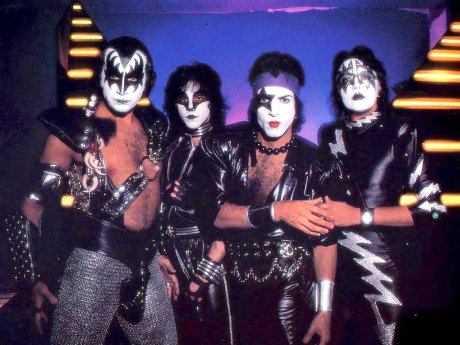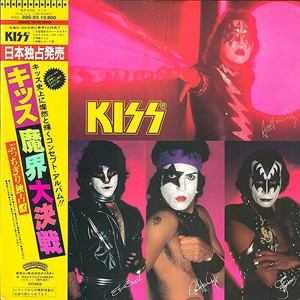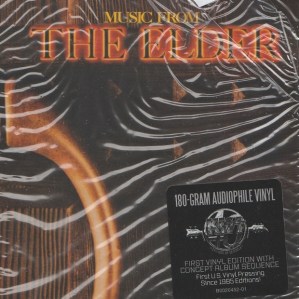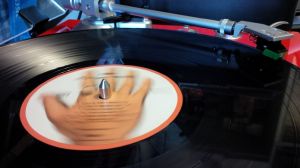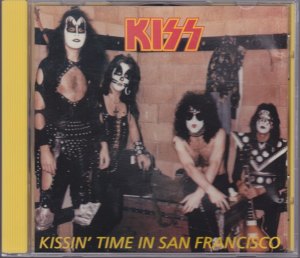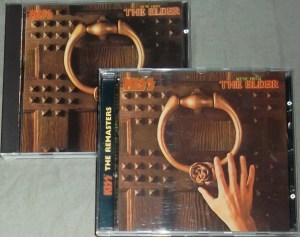Previous Reading:
Record Store Tales #600: The Vault
Disk 1 Review
Disk 2 Review
Disk 3 Review
For those keeping score at home, this CD contains tracks 46-60 in the Vault box set.
 GENE SIMMONS – The Vault – Disk 4 (2018 Rhino)
GENE SIMMONS – The Vault – Disk 4 (2018 Rhino)
“Plaster Caster” is one of the most memorable songs from Love Gun. This Simmons demo features the Demon on all instruments, including drums! Since he’s not a drummer, he played the kick and snare in one pass and and everything else in a second take. He seems to take great relish in explaining the story of the real “plaster caster” in the liner notes, but there’s no need for it here. Just listen to this interesting demo and hear Gene’s reasonable attempts at guitar solos. Not bad for just one guy. Love Gun ended up one of the classic Kiss albums that folks bicker about this song or that song being the weakest. You often see “Plaster Caster” on some of those “weakest” lists. Lyrically, sure but this song is indeed a master blaster. 4/5
Dynasty‘s “X-Ray Eyes” is another demo with Gene playing everything. It’s a lot more rock and roll than the final album version with is creepier and more atmospheric. This is more vintage early Alice Cooper. Fascinating again to hear how songs evolve. Also important to note the really good guitar solo work here, all done by Simmons. Here is a song that eventually made it onto a Kiss album, with Gene writing and recording everything on the demo itself. And people will still tell you he has no musical talent. 4/5
Another Dynasty track, “Charisma” is way heavier than the final. Gene plays everything but drums (and doesn’t tell us who plays drums). Gene says that “Charisma” is based around the chords of the old 1973 Wicked Lester song “Simple Type”. I’d never have guessed that if he didn’t tell us. This version of “Charisma” is more metal. It has a metallic chug, a metal guitar solo, and a heavier beat. Imagine if Kiss had gone with a different producer and overall direction on Dynasty! They were already evolving into a heavier band. 5/5
“Rockin’ In the USA” has a more Beach Boys vibe than the final Alive II version. Gene seems to relish explaining that Bob Kulick played lead guitar on the final version because Ace didn’t show up. “He could explain to you why,” says Gene with snark, though claiming he doesn’t want to “beat a dead horse”. OK then. He says this is him playing everything on this demo. He even did the very surf-y backing falsettos. It’s OK enough but it needed to be heavier as on the album. I will say this: the demo delivers some of the lyrics more clearly, and I was finally able to understand some of the lines for the first time. 3/5
“Radioactive” is a demo for a great little number that wound up on Gene’s solo album. Probably a superior demo to the final overproduced version that made it onto the album. The backing vocals here are way more rock and roll, and infectious. Sonic defects built into the demo concept aside, a lot of these tracks are actually better than the final versions, and may become my preferred listening experience in the future. 4.5/5
“See You In Your Dreams” is the Rock and Roll Over song that was later re-recorded on Simmons’ solo album. This demo includes Katey Sagal and other female backing singers, lending the demo a real Motown kind of feel. You can now understand why Gene wanted to re-record the song since Kiss turned it into a punked-up rocker without that Motown influence at all. 3/5
“Man of 1,000 Faces” is one of Gene’s most dramatic rockers on his solo album. There are two versions here. “Man of 1,000 Faces #1” is a heavier, stompier rocker. There is no hint whatsoever of the orchestration you’d later get. As a quaint little rocker, it’s not that bad. In the end, the majestic orchestral song is unique, and it’s hard to believe that it started like this. 3/5
“Man of 1,000 Faces #2” is a demo with Ace Frehley and J.R. Smalling, who played on quite a few Kiss demos including some of Paul’s such as “God of Thunder” and “Detroit Rock City”. Gene throws shade at Peter Criss for not being available for these demo sessions. This version is largely the same as the previous but with the Space Ace throwing in some leads. 3/5
“Calling Dr. Love” has Gene on most instruments except drums (uncredited). As we all know, the title was inspired by the Three Stooges. As you’ll learn from the liner notes, song titles are very important to Gene’s writing process. He says that this version is “re-created” by Kiss on the album and that is pretty close. The lyrics are not entire the same, but vocally and arrangement-wise, this is a finished song. 4/5
Those who have been collecting Kiss box sets and deluxe editions all these years know that “Bad Bad Lovin'” was an early version of “Dr. Love” before the right title struck. This demo should be familiar. It’s good, but the other demo version is where it needed to go. Gene says this is with Ace and J.R. Smalling. 3/5
“Almost Human” is a demo that Gene says Kiss captured definitively. This version is pretty close, with the high harmony guitars, all played by Gene. Some of Ace’s final fills are copied from this demo. This version could be even slower than the album take, and it really needed Ace’s touch. 3/5
“Burning Up With Fever #1” features Gene on all instruments, and is much rougher than “#2” on the prior CD. This is a pretty good skeleton of the song. It’s just more rock and roll than what we got on Gene’s solo album. It just goes to show you how the same song can go through many metamorphoses. 3/5
Katey Sagal and the Group With No Name (actual name!) are back on “True Confessions #1”, a rough demo of a song that wound up Gene’s solo album. The “#2” demo on the previous CD is the one to go with. This is interesting as are all the demos, but the good listening experience is the “#2” which had a better vocal by Gene. This one verges too much into the monster voice with an echo effect. 2.5
“Goin’ Blind/Little Lady” is a song I have waited years to hear. I always wanted to know why Gene sang that line in the Unplugged version, “Little lady from the land beneath the sea.” Then I remembered, “Goin’ Blind” used to be called “Little Lady”. I have been wanting to hear this demo since 1996. This demo dates back to Wicked Lester and has Gene with Brooke Ostrander. It is vastly different. A weird organ backs Gene up, and the chorus is a little different, though the guitar hook is intact. It is such an odd experience to hear this song, one of my favourite songs of all time, in this form. Hearing the quaint backing vocals, the very rough guitar solo, and just a very different direction overall…and then confessing that the early version just wasn’t very good. The final version may be a 5/5, but it took some doing (and heavy-ing up) to get there. Let’s be fair here. This is like Gene trying to re-write The Book of Taliesyn by Deep Purple, without Blackmore, Lord, or Paice. 2/5
“Larger Than Life” was re-recorded for Kiss Alive II and is one of the better songs of a batch that some fans find sub-standard. Others wish there were more songs in that direction. Gene’s demo has him playing everything but drums (uncredited). The final version is better, being heavier with a catchier bassline. This demo is more nocturnal and creepy. To use an analogy, since we all know what Gene is referring to here when he says “larger than life”…bear with me here. The final Kiss version is like Gene hitting you in the face with it, while here on the demo he’s just waving it around. I’m sorry. I do apologise. Back to this demo, it’s cool to hear Gene overdubbed on the backing vocals, but the final version needed Peter Criss and Bob Kulick to get where it had to be. 2.5/5
Finally we get to “It’s My Life”, an ancient Kiss song (Simmons/Stanley) that was released by Wendy O. Williams before Kiss finally re-recorded it and threw it on their Box Set. This has been a song that fans wanted for many years, though now you can get it on the Creatures of the Night box set. But how is it a Simmons/Stanley composition? Gene and Paul were not writing together very much at that time. Gene stole the chords from a Paul Stanley song called “Every Little Bit Of My Heart” that was rejected for The Elder! Paul didn’t like what Gene did with it. “It’s My Life” always should have been a Kiss song. It’s great that Gene released this version. It’s hard to tell who is playing the lead solo, but it’s great! 5/5
Average score by song: 3.43/5 stars
Disk 4 Track length and songwriters (from Wikipedia)
1. Plaster Caster (3:39) Simmons
2. X-Ray Eyes (3:44) Simmons
3. Charisma (3:18) Simmons / Marks
4. Rockin’ in the USA (2:57) Simmons
5. Radioactive (3:08) Simmons
6. See You in Your Dreams Tonight (2:20) Simmons
7. Man of 1000 Faces #1 (3:09) Simmons
8. Man of 1000 Faces #2 (3:32) Simmons
9. Calling Dr. Love (2:56) Simmons
10. Bad Bad Lovin’ (3:09) Simmons
11. Almost Human (3:26) Simmons
12. Burning Up With Fever #1 (3:08) Simmons
13. True Confessions #1 (3:34) Simmons
14. Goin’ Blind/Little Lady (3:06) Simmons / Coronel
15. Larger Than Life (4:06) Simmons
16. It’s My Life (3:51) Simmons / Stanley












